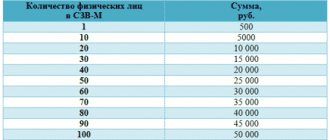The single tax under the simplified taxation system is paid once - at the end of the year. The deadlines for paying the simplified tax system are specified in Article 346.21 of the Tax Code of the Russian Federation - no later than the date established for submitting the annual declaration. For an organization this is March 31, and for an individual entrepreneur it is April 30 of the year following the reporting year.
In addition, during the year, simplifiers pay advance payments, which are taken into account when calculating the annual tax. The following deadlines are established for the transfer of advance payments according to the simplified tax system:
- April 25th for the first quarter;
- July 25th for the half year;
- October 25th for nine months.
If the deadline for transferring advances falls on a weekend or holiday, it is postponed to the next business day. In 2019, there is no such transfer, because the above deadlines fell on working days.
Free tax consultation
Is it necessary to pay advances under the simplified tax system?
The obligation to calculate and pay advances according to the simplified tax system for any of the two objects of taxation is provided for in Art. 346.21 Tax Code of the Russian Federation. So the answer is: yes, definitely. You can avoid paying an advance only if there is nothing to pay. For example:
- The simplifier with the object “income minus expenses” received a loss.
- An individual entrepreneur with the “income” object reduced the payment to zero. Let us remind you that only individual entrepreneurs who do not have employees can do this.
IMPORTANT! Individual entrepreneurs who have employees, as well as organizations, through deductions, can save no more than half of the tax under the simplified tax system “income”. Therefore, they will have an advance payment in any case. Well, if there was income, of course.
So what happens when the advance is not paid? Let's talk.
Basic information
To accurately calculate the prepayment, it is important to know that under the simplified tax system:
- The tax period is a calendar year;
- Reporting period – quarter;
- Tax calculations are made on an accrual basis from the very beginning of the year.
To fully pay the simplified tax, you must:
- Make three advance payments (there is no need to submit documentation for them);
- In the next tax year, pay tax without advance payments (you need to submit a tax return).
Penalties on tax advances under the simplified tax system
The most well-known and expected consequence of non-payment of advances under the simplified tax system, and for any taxes advancing the budget, is penalties. They are calculated from the unpaid amount for each day of delay, starting from the next day after the end of the payment period and up to and including the day of payment. The penalty rate for individual entrepreneurs is 1/300 of the refinancing rate, for organizations - 1/300 of the rate for the first 30 days of delay and 1/150 starting from the 31st day. The amount of penalties cannot exceed the amount of the payment for which they are accrued (Article 75 of the Tax Code of the Russian Federation).
Read more about calculating penalties on our website.
Our calculator will help you calculate them.
Is it possible to reduce the amount of penalties? Find out in ConsultantPlus. Get free demo access to K+ and go to the material to see a detailed answer to this question.
Results
What conclusions can be drawn regarding the issue of transferring advance payments to the simplified tax system? Let's name the main ones:
- Advance payments are transferred only if there is taxable income in the reporting period. If the first income of the simplified taxation tax payer for the calendar year was received in the 4th quarter, the advance is not calculated. This income is subject to tax, which must be paid by March 31 for organizations and by April 30 for entrepreneurs.
- The advance can be reduced to zero due to paid insurance premiums, but only individual entrepreneurs without employees have this right.
- Until an organization or entrepreneur submits an annual declaration, the Federal Tax Service does not know what advance payments should have been transferred. The fact of violation of the deadlines for payment of advances will be revealed after the end of the reporting year and a desk audit of the declaration. At the same time, the Federal Tax Service will issue a demand for payment of penalties.
- If you have not paid your advances on time, do so as soon as possible to shorten the period for accrual of penalties. Organizations after 30 days of delay pay penalties at higher rates than individual entrepreneurs.
- There is no penalty for violating the deadlines for transferring advance payments under the simplified tax system.
Explanations to the tax office according to the simplified tax system
Without waiting for any payments, the tax office may ask you to explain. In this case, you will receive an information letter asking you to tell why there is no money. If you have a reasonable and well-reasoned explanation for this, please respond. But if you don't answer, nothing will happen to you. This is not a request for explanations, for failure to provide which there is a fine, but just a letter. Let us remind you that the tax office has the right to request information or documents in limited cases, and this does not apply to them.
Special terms for payment of advances
- The company no longer engages in activities subject to the simplified procedure - payment by the 25th of the month following the termination of operations.
- The taxpayer lost the right to use the simplified tax in the middle of the year - the tax must be paid by the 25th day of the month following the quarter in which the right to use the simplified tax was lost.
If the last day of tax payment falls on a weekend, the advance payment is paid on the next working day.
Fine under the simplified tax system, collection of advances, seizure of property, account blocking
Tax authorities do not have the right to impose a fine for non-payment of advances under the simplified tax system. First of all, because a fine can only be issued for non-payment of tax for the year. For failure to pay advances under the simplified tax system, such liability does not apply. In addition, in order to receive a fine, you must distort the tax base, and you have not yet declared it.
As for the collection of uncollected amounts, seizure of property and blocking of an account, none of the indicated actions in relation to advances not paid by the simplifier during the year is impossible. To carry out each of them, tax authorities must have accurate information about the amount of arrears. But with advances under the simplified tax system before the taxpayer submits a declaration, this is impossible.
When you submit it and the tax authorities see the whole picture, then you cannot avoid demands for payment. Moreover, they will charge it for the entire amount of advances for the year, even if at the end of the year there will be less tax or no tax at all. Fail to pay, and the money will be forcibly written off. But this can also be circumvented: simply postpone submitting the declaration until the last day of the reporting period.
We described how this method works here.
How will a simplifier be punished for non-payment of advance amounts?
The only measure of liability that is provided for non-payment or late payment of advances is penalties. And regarding penalties for the single tax under the simplified tax system, there is such a nuance: during the year, tax authorities do not know whether the taxpayer must pay advances, and if so, what amount. After all, the declaration, which presents all the information on advances for each quarter, is submitted at the end of the year. During the year, an individual entrepreneur can reduce the amount of the advance with the help of deductions in the form of paid insurance premiums to 0, the amount of income may be lower than the amount of expenses under the income-expenditure simplified tax system, and in general the business entity may simply not carry out activities.
Thus, only after receiving a tax report can inspectors calculate the amount of penalties for each period and issue a demand to the taxpayer.
Did not punch a check or ignored the rules for working with cash registers
If an entrepreneur on the simplified tax system uses a cash register in his work (or should use it by virtue of 54-FZ, but does not do so), he may also fall under the “hot financial hand”.
Let’s say you “forgot” to buy and register a cash register - get it and sign for it: the fine will be from 25 to 50% of the sale amount (and at least 10,000 rubles). So, they sold goods for 500 rubles, the receipt was not punched, but ten thousand, please, pay.
If an individual entrepreneur does buy a cash register, but the wrong one, in the sense that he purchased a device that is not included in the register of cash register equipment approved for use, he can earn a fine of 1,500-3,000 rubles. (clause 4 of article 14.5 of the Code of Administrative Offenses of the Russian Federation).
Fund sanctions against individual entrepreneurs
In addition to the tax inspectorate, control over accounting is carried out by extra-budgetary funds. Similarly, with the Federal Tax Service, sanctions are levied for failure to submit information, reporting and non-payment of contributions.
Fund inspectors resort to imposing fines:
- If the deadlines for payment of contributions are violated, a penalty will be charged.
- If you refuse to submit the required forms and information, you will be charged 200 rubles for each document not received by the fund.
- Late payment due to an understatement of the base is punishable by a fine of 20% of the unpaid contribution on time.
- If reporting with accrued contributions is not submitted on time, a fine will be charged in the amount of 5% of the unpaid amounts for each month of delay. The maximum sanction amount is 30% of non-payment.
The majority of violations are identified during inspections. Control authorities use programs that automatically monitor taxpayer violations. Based on the identified data, inspectors order desk and on-site inspections.
Important! Control authorities can apply sanctions only within 3 years from the period of violation. Any earlier date is subject to the statute of limitations.
What to do if a fine is awarded? The individual entrepreneur must pay the amount to the budget within the period specified in the decision or requirement of the control authorities. Paying sanctions is different from paying taxes. The amount must be paid taking into account the BCC payment. The payment order must indicate the document and its date on the basis of which the fine is paid.
Didn't communicate with the tax office
The tax office may request or, more precisely, demand documents from the entrepreneur (as part of a counter audit). That is, the tax office asked to provide documents about the counterparty, but the entrepreneur did not provide them on time or did not provide them at all - the fine will be 10,000 rubles.
The path of an entrepreneur is difficult and thorny, and all unforeseen situations are difficult to predict. But some tasks can and should be delegated to a service that will simplify the preparation of reports and help avoid mistakes when paying taxes and contributions. In addition, it will help you save money.
As part of using the “My Accounting 1C” service from Promsvyazbank, an entrepreneur receives a free issue of a CEP (qualified electronic signature) and the opportunity to send reports to regulatory authorities without payment.
Late payment of tax
The amount accrued according to the declaration must be paid into the budget within the period established by the Tax Code of the Russian Federation for each tax separately. For example, for UTII the payment deadline is the 25th of the month after the end of the quarter, and for collections to funds - the 15th of the month. The consequences for individual entrepreneurs will be expressed in penalties and fines. The amount of the penalty is calculated daily at the refinancing rate in force in the period.
If the tax is not paid in full, the amount of sanctions is collected in the amount of 20% of the understatement. When imposing sanctions, the unintentional nature of the reduction in the amount of the obligation is taken into account. If the tax authorities prove the taxpayer’s intent, the amount doubles.
A fine is imposed if the regulatory authority notices non-payment. The amount of the sanction must be revealed during the audit and reflected in the decision. If a taxpayer, for example, UTII, did not pay the tax on time due to an erroneous understatement of the base, then the question arises of what to do next.
In this case it is necessary:
- Pay the missing amount and submit an updated declaration.
- Provide updated data or pay to the budget.
If the taxpayer paid before submitting the return, no penalty will be imposed. At the time of submitting the clarification, the required amount is available and will be taken into account towards the payment.
Sanctions for violation of accounting rules
In the process of conducting business, an individual entrepreneur must keep records of assets, income and expenses. Based on accounting data, the amount of taxes indicated in the declaration and contributed to the budget is determined. The Tax Code of the Russian Federation (Article 120) provides for a fine for gross violation of accounting rules for the absence of:
- Primary accounting forms confirming expenses incurred and accounting data.
- Recording transactions and availability of accounting registers.
- Regular ignorance or incorrect reflection in the accounts of business transactions, movements of material assets, cash and other assets.
The amount of the sanction is set at 10 or 30 thousand rubles if a violation is detected over several periods. The minimum amount is provided for individual entrepreneurs who have paid the full amount of taxes. If a violation reveals an understatement of the base when calculating taxes, sanctions are imposed in the form of 20% of the amount of non-payment with a minimum penalty of 40 thousand rubles.
Each system has its own accounting and document flow procedures. The most minimal accounting is provided by UTII, in which the individual entrepreneur only keeps records of the physical indicator. Failure to record income, property, and assets with UTII does not entail a fine from the Federal Tax Service. The accounting requirements for UTII are simpler than a patent, the purchase of which requires taking into account income to prevent excess.
Didn't apply for a license
Some of the activities of individual entrepreneurs are subject to mandatory licensing. This applies to cases if the entrepreneur is a private detective, or, for example, he has a bus on which he transports passengers.
If an entrepreneur works without a license, he may face a fine of 4 to 5 thousand rubles. (Article 14.1 of the Code of Administrative Offenses of the Russian Federation). And besides this, manufactured products, production tools and raw materials may be confiscated from him. Returning a couple of paragraphs back to the example about the driver, let’s clarify that the bus itself can be taken away.
A special case of individual entrepreneur reporting
A special place among declarations is occupied by reporting on UTII. The system is used when conducting certain areas of activity. If an entrepreneur has switched to UTII, but does not conduct business, zero reporting is not submitted. Taxation is based on physical indicator data. The tax is levied only during the period of application of UTII and does not depend on revenue.
Reporting on UTII is submitted from the date of registration until the date of filing the notice of termination of its application. If the taxpayer does not file a return upon actual termination of activity, but before filing a notice, a fine will be imposed on the individual entrepreneur.
The procedure for applying tax sanctions to individual entrepreneurs
The legality of conducting activities is established upon registration of an individual entrepreneur. Conducting commercial activities without official registration is prohibited by law.
The signs of doing business are:
- Production, use, sale of property and material assets for the purpose of making a profit.
- Carrying out transactions with drawing up contracts.
- Maintaining records of transactions.
Conducting activities without state registration entails punishment under the Administrative Code of the Russian Federation. The actions have consequences for the person in the form of a fine of up to 2 thousand rubles. The minimum amount of sanctions is 500 rubles, but almost always the maximum amount is charged.
Violation of the registration deadlines (Article 116 of the Tax Code of the Russian Federation) entails a fine from the Federal Tax Service Inspectorate. The amount is 10 thousand rubles if there is no income. If revenue was received in an unregistered period, the amount of sanctions increases to 10% of its value and is charged in an amount of at least 40 thousand rubles.
Conducting the activities of an individual entrepreneur without obtaining a license for types that require licensing also entails punishment under the Code of Administrative Offenses. If the results of activities cause damage to the state or individuals, sanctions can reach 300 thousand rubles. Based on the results of determining the damage, a person may be held criminally liable.
Important! It is possible to prevent the imposition of fines in the course of conducting commercial activities of an individual entrepreneur by complying with the law. To prevent receiving sanctions, you need to study the provisions of laws and regulations or contact tax and accounting specialists.
An example of calculating a penalty according to Article 23.1 of the Civil Code
A man entered into a purchase and sale agreement with a car dealership for an Opel Astra. On December 21, 2012, he makes an advance payment to the car dealership for the car in the amount of 600,100 rubles (partly from his own money in cash at the car dealership’s cash desk, partly from a loan). The purchase and sale agreement states that the car dealership undertakes to transfer the car to the buyer no later than 39 banking days after the buyer pays the cost of the goods. After the delivery deadlines were violated, the man decided to take the advance payment and terminate the sales contract. The car dealership made a full refund of the prepayment amount on March 28, 2013.
Calculation of penalties Delay period - from 02/23/2013 to 03/28/2013 = 34 days Prepayment amount = 600,100 rubles. Penalty for 1 day of delay = 600,100 rubles * 0.5% = 3,000.50 rubles Total penalty = 3,000.50 rubles * 34 days = 102,017 rubles. 102,017 rubles is not more than the prepayment amount of 600,100 rubles, that is, the amount of the penalty will be 102,017 rubles
Let us explain the calculation procedure.
- Calculation of delivery time. A banking day corresponds to a working day. Therefore, for calculations we will use the officially approved production calendar, which indicates all working and non-working days. The prepayment was made on December 21, 2012 (this is Friday), so the first day of counting the delivery period will be the next business day - Monday, December 24, 2012. We count 39 working days according to the calendar. The 39th working day is February 22, 2013, that is, this is the last day when the car dealership can deliver the car without violating the deadline.
- Overdue. From February 23, 2013, the car dealership begins to be in arrears, and this will be the first day the penalty is accrued. We draw your attention to the fact that the penalty is calculated in calendar days, and not in banking or working days, since this is precisely the procedure provided for by the law on the protection of consumer rights. The last day for accrual of penalties will be March 28, 2013. If a man wanted to wait for the car to be delivered, then the last day for which a penalty could be charged to the car dealership would be the day the car was handed over to him. Thus, we accrue the penalty for the period from February 23 to March 28, 2013, which is 34 days.
How to receive a penalty under Article 23.1 of the Civil Code?
First, you need to write a claim for payment of a penalty and delivery of prepaid goods / return of prepayment. You can use our free claim examples.
Sample claim - late delivery of a pre-paid car (transfer or refund of money, penalty) Sample claim - delay in delivery of a pre-paid product (transfer or refund of money, penalty)
The detailed procedure for receiving a penalty and returning the prepayment is described in our instructions: You have made an advance payment for the goods, the delivery time has passed, the goods are not being delivered, what should you do?







